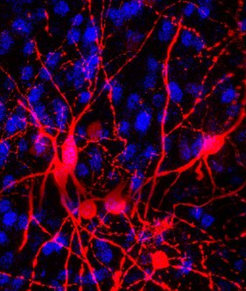Two new research groups at the Max Planck Institute for Brain Research
Alison Barker and Vanessa Stempel joined the Max Planck Institute for Brain Research as new research group leaders in 2021. Alison Barker brings a new model organism to the institute: her group will work on the neural mechanisms underlying social communication in naked mole rats. Vanessa Stempel’s group studies the neural circuits underlying adaptive instinctive behaviours, working at the interface of neuroethology and -physiology.
Social Systems and Circuits

In December 2021, Alison Barker started her research group ”Social Systems and Circuits” at the MPI for Brain Research (MPIBR). Her group will focus on the neural mechanisms underlying social communication. Barker’s research adopts a broad evolutionary perspective, studying vocal communication in the naked mole-rat (Heterocephalus glaber). Naked mole-rats are highly social rodents which live in large multi-generational colonies under the rule of a single breeding female, queen.
Our ability to communicate shapes our interactions with our environment and with members of our social groups. This is especially true for the naked mole-rat with colonies of up to 300 individuals in the wild. Individual members within the group must coordinate numerous tasks including foraging, colony defense and care of pups. Naked mole-rats use more than 25 distinct vocalizations which have been shown to support many aspects of their social behavior. Barker’s group will investigate how information related to these cooperative behaviors is encoded in vocalizations and subsequently decoded by specialized neural circuits. By adapting traditional tools for neural circuit dissection along with developing new computational tools and machine learning frameworks, Barker aims to investigate how social information is transmitted within social units and ultimately drives cooperation.
Barker: “I can imagine no better home for the naked mole-rats than the MPIBR, where pioneering neuroscience research is driven by creativity, cutting edge technological innovations and, of course, the study of many other fascinating ‘non-traditional’ model organisms. I’m excited to hear what the naked mole-rats continue to teach us as we begin to delve into their remarkable social behavior on a neural level.”
"I can imagine no better home for the naked mole-rats than the MPI for Brain Research (...)"
Alison Barker studied Biochemistry at Brown University. During her doctoral work she studied size selectivity in the visual system of larval zebrafish working with Herwig Baier in San Francisco and in Martinsried at the Max Planck Institute of Neurobiology. In 2015, she received her PhD in Neuroscience from the University of California, San Francisco (UCSF). In her postdoctoral work with Gary Lewin at the Max Delbrück Center for Molecular Medicine she first began working with naked mole-rats where she demonstrated that naked mole-rats use distinct vocal dialects to transmit information about social membership, and that these vocal cues can be learned early in life.
Instinctive Behaviour Circuits

Vanessa Stempel joined the MPI for Brain Research as a new Max Planck Research Group Leader in April 2021.
Instinctive behaviours, such as hunting, escape and mating, are an animal’s survival kit of actions that they acquire with little to no experience. In vertebrates, they are generated by remarkably conserved brain circuits, and it has become increasingly clear in recent years that instinctive behaviours are not just stereotyped action patterns but that they can be flexible in regard to both action selection and execution.
Her Instinctive Behaviour Circuits Group is using a multidisciplinary approach, combining in vivo neural activity recordings and manipulation experiments in ethologically-relevant behavioural tasks with molecular, cellular and circuit-level analyses in vitro.
Stempel: „I feel incredibly lucky to have started my lab here at the MPI for Brain Research, surrounded by amazing colleagues. My group will have a strong neuroethological focus and study the neural mechanisms underlying instinctive behaviours. We have just started to do our first experiments, so it’s truly exciting times!”
"We have just started to do our first experiments, so it’s truly exciting times!”
Vanessa Stempel studied Biology in Germany, Poland and the UK. She received her PhD from the Free University Berlin, where she worked on neuronal plasticity mechanisms in the group of Dietmar Schmitz. For her postdoc, Vanessa joined the group of Tiago Branco, first at the MRC Laboratory of Molecular Biology, Cambridge and then at UCL, London to investigate the neural basis of escape in mice. In particular, she studied how neural circuits in the brainstem integrate information about threats and initiate escape.













